ELSI Blog
143 The 2018 Astrobiology Graduate Conference from the Eyes of an ELSI Researcher
From June 4th to June 8th, the 2018 NASA Astrobiology Graduate Conference (AbGradCon) was held at Georgia Institute of Technology in Atlanta, Georgia, USA, which I had the opportunity to attend. About 100 young researchers studying various aspects of astrobiology, including graduate students and early-career postdocs, convened to discuss their latest scientific findings. AbGradCon was developed many years ago as a way to give an opportunity to young researchers to present their research to their peers in an open faculty-free, pressure-free environment, where at larger conferences such young researchers either may not have opportunities at all to present their research, or would be under too much pressure being in the same room as some famous and very critical researchers. Thus, often it is at AbGradCon that young astrobiology researchers are first able to present their results in a real conference setting. The attendees of this meeting included researchers from many countries, including those from Asia, Europe, and South America, in addition to those in North America. In recent years, ELSI has sponsored this conference in some capacity, as ELSI expects that this will foster the development of young Astrobiology researchers around the world.
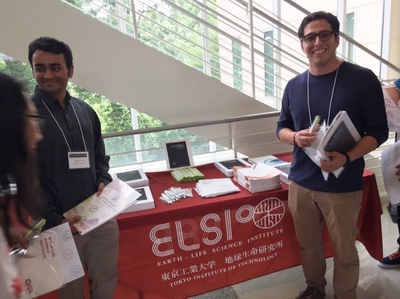
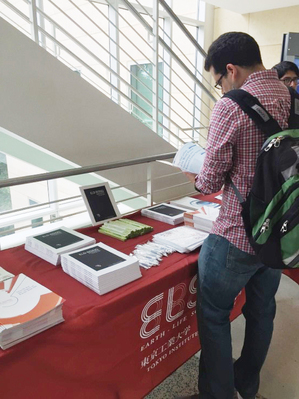 Students and young researchers at the ELSI desk during the AbGradCon poster sessions.
Students and young researchers at the ELSI desk during the AbGradCon poster sessions.
I was able to meet many of the attendees, and it turns out that a handful have already had the opportunity to visit ELSI, whether for research collaborations, attending symposia/workshops, or enrolling in the recent EON*-ELSI Winter School held in early 2018. For example, two of the attendees of AbGradCon were Vyacheslav (Slava) Tretyachenko and Valerio Giacobelli from the laboratory of Prof. Klara Hlouchova at Charles University in Prague, Czech Republic. Slava and Guido are collaborators of ELSI researcher Dr. Kosuke Fujishima, and Valerio was given the opportunity to present an oral presentation on his work studying reduced peptide evolutionary processes. Although Dr. Fujishima was not able to attend the conference himself, his presence was surely felt as the collaborative work between Dr. Fujishima and the Hlouchova lab was incredibly interesting and promising!
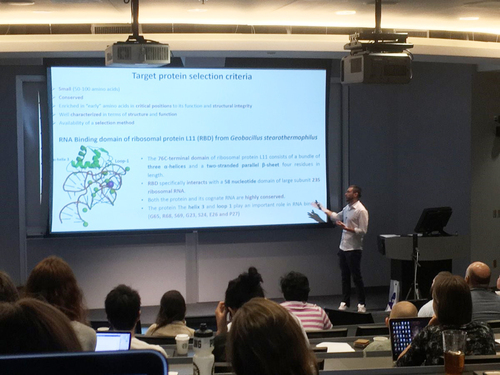 Valerio Giacobelli presenting his work on reduced peptide evolutionary processes
Valerio Giacobelli presenting his work on reduced peptide evolutionary processes
Another AbGradCon attendee that I was able to meet (again) was Niraja Bapat from the Chemical Origins of Life Laboratory run by Prof. Sudha Rajamani at IISER-Pune (Indian Institute of Science and Education Research) in Pune, India. Prof. Rajamani is a longtime collaborator and visitor of ELSI, and has a long-term collaboration with ELSI researcher Dr. Yayoi Hongo and others studying chemical evolution of primitive molecules; and Niraja was able to visit ELSI for one month in late 2017 with the support of EON to perform collaborative work and also to attend EON workshops on biosignatures and life detection technology (both of which I attended as well, allowing us to have nice research discussions). At AbGradCon 2018 Niraja presented her very interesting work on primitive RNA replication, some of which we were able to discuss during her visit to ELSI. She was also named a finalist for the inaugural Maggie Turnbull Service Award in Astrobiology for her work on science education in India. It's so great that one of ELSI's longtime collaborators and friends is being recognized for her efforts in effecting change in international science education!
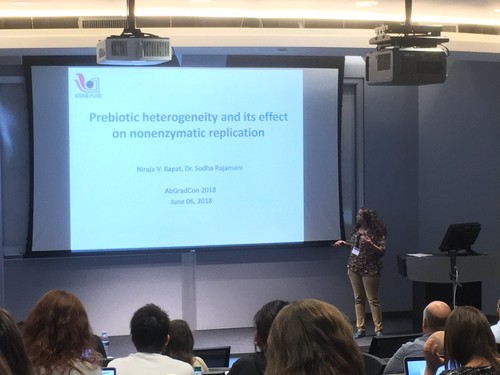 Niraja Bapat presenting her work on nonenzymatic RNA replication
Niraja Bapat presenting her work on nonenzymatic RNA replication
Amazingly, there were also five students at AbGradCon who also attended the 2018 EON-ELSI Winter School: Flavia Callefo (University of Campinas, Campinas, Brazil), Hikaru Furukawa (Arizona State University) Daniela Kroiss (City University of New York), Lara Maldanis (Brazilian Synchrotron Light Laboratory and University of São Paulo, Brazil), and Lena Vincent (University of Wisconsin), and both Lara and Hikaru (who is actually an alumna of Tokyo Institute of Technology!) had the opportunity to give oral presentations (while the rest had poster presentations); kind of a mini-reunion of the Winter School attendees (including Winter School organizers Prof. Shawn McGlynn and myself; Prof. McGlynn was invited to give the keynote seminar!). The EON-ELSI Winter School was held over two weeks in early 2018 and provided students an opportunity to take a short survey course covering all topics in Earth-Life Science, and also was a way for students from around the world to make long-lasting professional collaborations and personal connections (there were attendees from 5 continents!). It's quite amazing that more than 10% of the 2018 Winter School attendees, who each came from very different institutes around the world in a variety of research disciplines, found themselves at the same conference in a different country. This owes to both the breadth of the field of Earth-Life Science, but also the success of the Winter School on fostering international connections and collaborations, as these students each represent a different institution (and themselves are from four different countries of origin). It's possible that in the absence of the Winter School, these students may not have had an opportunity to form such strong connections, and it will be exciting to look forward to how these students cultivate their strong connections going forward, as well as how they blossom as successful researchers! It's very likely that there will be other conferences around the world which may also be well-attended by a large proportion of the Winter School attendees!
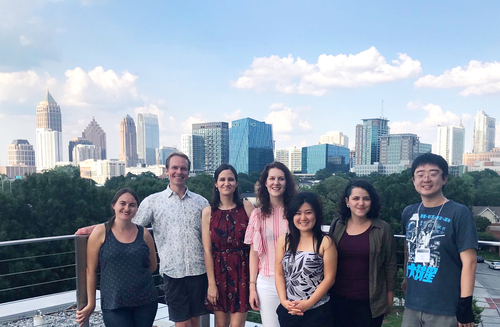 Mini-reunion of some Winter School attendees and organizers
Mini-reunion of some Winter School attendees and organizers
Finally, the conference itself was also a great opportunity to establish new connections and collaborations. Martina Preiner is a student at University of Dusseldorf studying primitive metabolic networks, and based on our discussions at AbGradCon, she had the opportunity to visit ELSI in mid-July to give a presentation and co-lead (with her colleague Dr. Joana Xavier) the weekly Origins of Life group discussion at ELSI. Without an opportunity to meet at an international conference for young researchers such as AbGradCon, such a connection would simply not be possible. It's great that ELSI researchers and collaborators have been able to make such strong international connections at various conferences around the world. These connections and collaborations have already enriched scientific understanding and discussions here at ELSI, and perhaps at other institutes around the world as well. Hopefully, we will have the opportunity to host AbGradCon here at ELSI sometime in the near future!
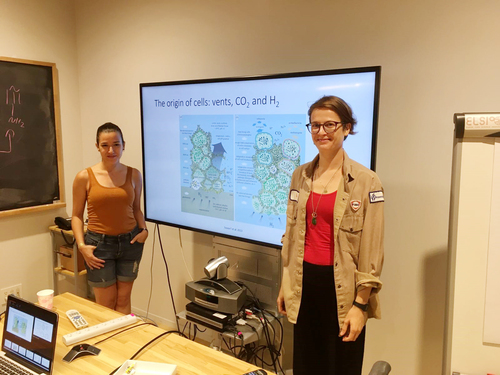 Dr. Joana Xavier and Martina Preiner leading the ELSI Origins of Life discussion group
Dr. Joana Xavier and Martina Preiner leading the ELSI Origins of Life discussion group
*EON: ELSI Origins Network. EON was formed in July 1, 2015 to build a cohesive and lasting global network of researchers working to address questions relating to the origins of life. It created an interdisciplinary network of more than 500 researchers. Although the first funding has ended on March 31, 2018, the network is continuing to grow.











